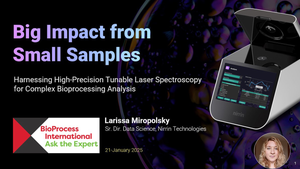
The contract development and manufacturing organization (CDMO) has upgraded its GMP bioconjugation capacity, adding a 2,300 square-foot suite, including 500 liter bioreactors for clinical-scale manufacturing, and a 1,400 square-foot Grade C cleanroom.
The cleanroom will use both flexible and hard containment technologies to safely handle highly potent molecules with exposure limits down to 0.01 micrograms per cubic meter, the firm said. The facility is expected to open in early 2026.
“The expansion will share some facilities with the existing suite,” a spokesperson for the firm told BioProcess Insider, “but the cleanroom will be equipped with capabilities to enable scale-up manufacture and conjugation of ADCs. This will allow the suites to be used in tandem for complex processes or handle two individual projects simultaneously.”
“The existing suite is 430 square-meters and includes a Grade C cleanroom with supporting infrastructure such as a water for injection plant, and separate areas for buffer preparation. Manufacturing is undertaken in disposable canopy isolators and there is the option to use either disposable or glass reactors within them. There is also dedicated chromatography and tangential flow filtration equipment, and the suite is designed to handle manufacturing of up to 1-kg batch sizes.”
According to the firm, the expanded suite will use both hard containment and flexible isolators, enabling a range of processes to be handled. The company will utilize single-use, disposable bioreactors to eliminate potential cross contamination between projects and reduce risks.
Based on feedback from customers and market intelligence, the spokesperson said the “[ADC market] shows that clinical-scale manufacturing has the lowest capacity but the highest demand globally.”
“The team at the facility has great expertise in bioconjugation, and this has historically been associated with oncology treatments and the conjugation of highly toxic payloads. However, the scope of ADCs is now changing, with other molecules such as peptides, immunocytokines and proteolysis targeting chimera (PROTAC) being conjugated to antibodies, to allow the development of treatments for non-oncology related diseases.”
The Cramlington, UK-based CDMO entered the ADC space with the acquisition of ADC Bio in 2021. The deal brought with it a 6,500 square-meter site in Deeside. Sterling invested £1 million ($1.3 million) in the site, increasing laboratory space from 275 to 419 square meters, installing a new mass spectrometer, and reconfiguring the layout for potential future additional services in 2022.
The Deeside facility was granted an authorization for investigational medicinal products from the UK’s Medicines and Healthcare products Regulatory Agency (MHRA) in April 2023, which allows the manufacture of ADCs for clinical use under good manufacturing practices (GMP).
About the Author
You May Also Like








